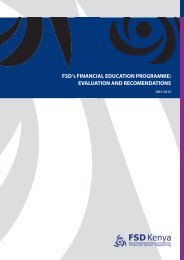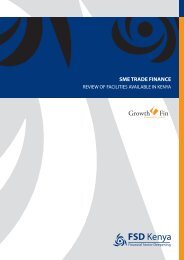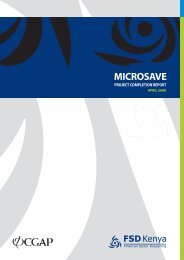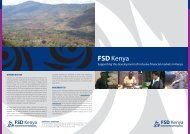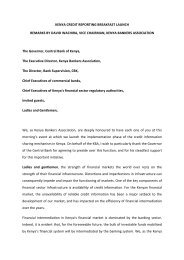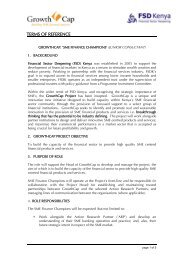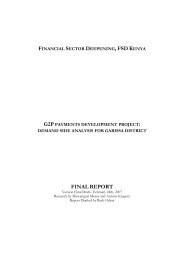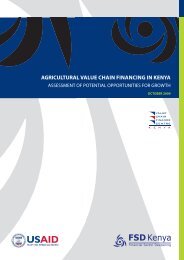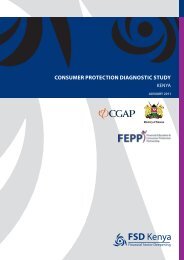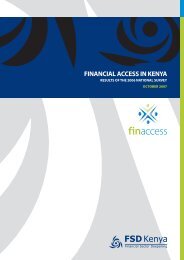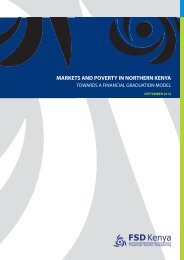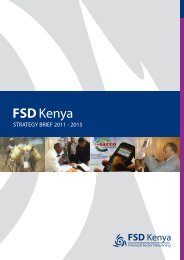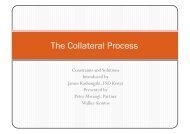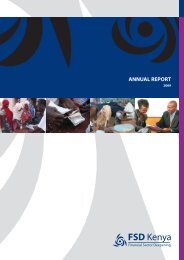Automation of SACCOs - FSD Kenya
Automation of SACCOs - FSD Kenya
Automation of SACCOs - FSD Kenya
You also want an ePaper? Increase the reach of your titles
YUMPU automatically turns print PDFs into web optimized ePapers that Google loves.
Chapter 1<br />
introDuCtion<br />
1.1 ConTEXT<br />
<strong>FSD</strong> <strong>Kenya</strong> is an independent trust established to support the development <strong>of</strong><br />
inclusive financial markets in <strong>Kenya</strong> as a means to stimulate wealth creation<br />
and reduce poverty. Working in partnership with a diverse range <strong>of</strong> financial<br />
institutions, business service providers, and support institutions, the goal <strong>of</strong><br />
<strong>FSD</strong> <strong>Kenya</strong> is to significantly expand access to financial services among lower<br />
income households and smaller scale enterprises by developing the capacity<br />
<strong>of</strong> the financial services industry.<br />
<strong>FSD</strong> recognises the critical role <strong>of</strong> <strong>SACCOs</strong> in providing access to financial<br />
services to low income households in <strong>Kenya</strong>. The FinAccess 2009 study<br />
undertaken by <strong>FSD</strong> indicates that <strong>SACCOs</strong> are one <strong>of</strong> the leading sources <strong>of</strong><br />
rural finance and in many rural areas the local SACCO is the only provider <strong>of</strong><br />
financial services. While the exact number <strong>of</strong> <strong>SACCOs</strong> operating in <strong>Kenya</strong> is not<br />
known, estimates range from almost 4,000 up to 5,000. About 200 <strong>of</strong> these<br />
are considered deposit-taking <strong>SACCOs</strong>, <strong>of</strong>fering front <strong>of</strong>fice savings activities.<br />
Efforts have been undertaken by the <strong>Kenya</strong>n Ministry <strong>of</strong> Cooperative<br />
Development and Marketing to reform the enabling environment for <strong>SACCOs</strong>.<br />
The SACCO Societies Act 2008 passed into law at the end <strong>of</strong> last year. It will<br />
require deposit-taking <strong>SACCOs</strong> to meet strong new regulatory standards.<br />
A task force <strong>of</strong> industry stake holders has been constituted by MoCDM to<br />
draft the new regulatory framework, focusing on the establishment <strong>of</strong> the<br />
new SACCO Societies Regulatory Authority (SASRA). As the new regulations<br />
are expected to be gazetted early 2010, there is now an urgent need for<br />
significantly reforming the estimated 200 <strong>SACCOs</strong> <strong>of</strong>fering FOSA.<br />
Technology is considered a main enabler <strong>of</strong> compliance. More robust<br />
management information systems will enable <strong>SACCOs</strong> to manage their<br />
operations more efficiently, manage growth, and generate reliable reports for<br />
both management and the forthcoming regulatory authority. While studies<br />
have taken place to identify potential information technology (IT) solutions that<br />
could meet the needs <strong>of</strong> <strong>SACCOs</strong>, there has not yet been a thorough analysis<br />
<strong>of</strong> the strengths and weaknesses <strong>of</strong> these solutions, nor an opportunity to test<br />
the solutions in a live setting or to assess potential implementation challenges.<br />
As such, <strong>FSD</strong> has contracted Accenture Development Partnerships (ADP) to<br />
undertake an analysis <strong>of</strong> automation options available to <strong>SACCOs</strong> with the aim<br />
<strong>of</strong> identifying ways to improve automation and increase transparency across<br />
the sector.<br />
1.2 ProJECT oBJECTIVES<br />
The overall objective for this project is to identify viable automation solutions<br />
for <strong>SACCOs</strong>. Within the heterogeneous group <strong>of</strong> <strong>SACCOs</strong>, the focus is on midsized<br />
to large <strong>SACCOs</strong> with FOSAs as they will be the first to be targeted by<br />
regulation.<br />
AUTOMATION OF SACCOS: ASSESSMENT OF POTENTIAL SOLUTIONS • 1<br />
The automation solutions shall:<br />
meet business as well as technical system requirements <strong>of</strong> the <strong>SACCOs</strong>,<br />
consider the constraints <strong>SACCOs</strong> are facing (i.e. staff capacity, information<br />
technology literacy, budget, connectivity),<br />
improve the quality and timeliness <strong>of</strong> their management information<br />
and thus help <strong>SACCOs</strong> prepare for forthcoming regulatory requirements.<br />
To recommend viable automation solutions, the requirements for potential<br />
systems needed to be gathered in the first place. <strong>SACCOs</strong>’ business processes<br />
and circumstances had to be clearly understood and then translated into<br />
requirements. Also, the likely regulatory requirements were reviewed to<br />
understand their impact on the selection <strong>of</strong> potential systems. Once a clear<br />
set <strong>of</strong> functional as well as technical requirements had been developed, the<br />
next step was to identify automation solutions available in the market and<br />
assess their viability. Based on analysis <strong>of</strong> the results, recommendations were<br />
provided on appropriate ways to tackle automation by <strong>SACCOs</strong> preparing for<br />
regulation.<br />
1.3 PrELIMInArY ProJECTS<br />
Apart from the SACCO <strong>Automation</strong> project commissioned by <strong>FSD</strong>, two main<br />
evaluations <strong>of</strong> available SACCO s<strong>of</strong>tware have taken place in recent years.<br />
In 2007, the World Council <strong>of</strong> Credit Unions (WOCCU) <strong>Kenya</strong> went through<br />
a s<strong>of</strong>tware evaluation exercise within their SACCO Growth project. WOCCU<br />
had raised funds to support the implementation <strong>of</strong> new systems in selected<br />
<strong>SACCOs</strong> to help them grow their membership. To solicit for SACCO s<strong>of</strong>tware<br />
proposals from local vendors, WOCCU placed a paid advertisement in the<br />
Daily Nation. Out <strong>of</strong> 19 initial responses three vendors were finally short-listed,<br />
namely Fintech, Craft Silicon, and CoreTec. They were requested to familiarise<br />
themselves with the five <strong>SACCOs</strong> taking part in the project and provide financial<br />
proposals accordingly. It was Fintech and Craft Silicon who were finally chosen<br />
to partner with WOCCU and the selected <strong>SACCOs</strong> for implementation.<br />
Another s<strong>of</strong>tware evaluation project was initiated by Co-operative Bank,<br />
which has been providing capacity building services to the SACCO sector. Cooperative<br />
Bank, in close collaboration with MoCDM, invited proposals from<br />
system vendors in late 2008. A total <strong>of</strong> 25 proposals were received and 14 <strong>of</strong><br />
these short-listed. The selected vendors are expected to hold demonstrations<br />
<strong>of</strong> their solutions and based on these recommendations will be made to the<br />
<strong>SACCOs</strong>.<br />
The conclusions from the WOCCU project have been taken into consideration. At<br />
the time <strong>of</strong> undertaking the analysis the Co-op Bank study was still in progress<br />
and consequently not available to the project team. The information above has<br />
been used to understand which vendors were available on the <strong>Kenya</strong>n market<br />
at that time and to take part <strong>of</strong> practical experience from system selection and<br />
implementation in the SACCO sector.



